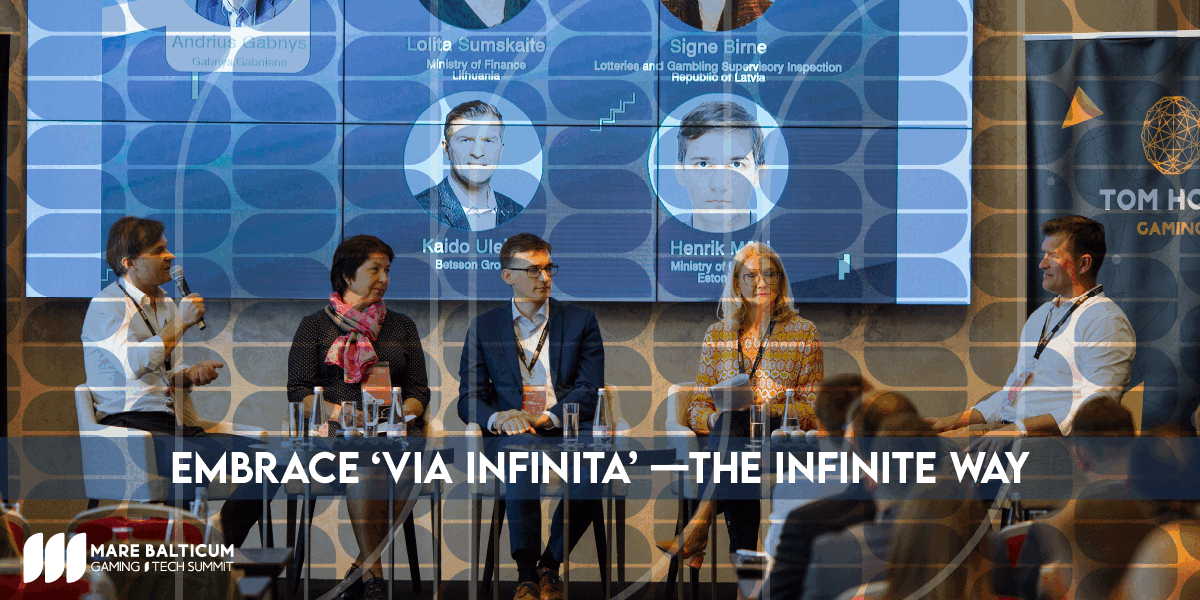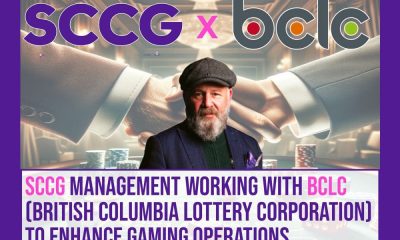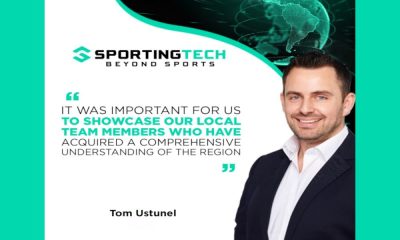Interviews
Roundtable – Continent 8’s Leaders and Legends
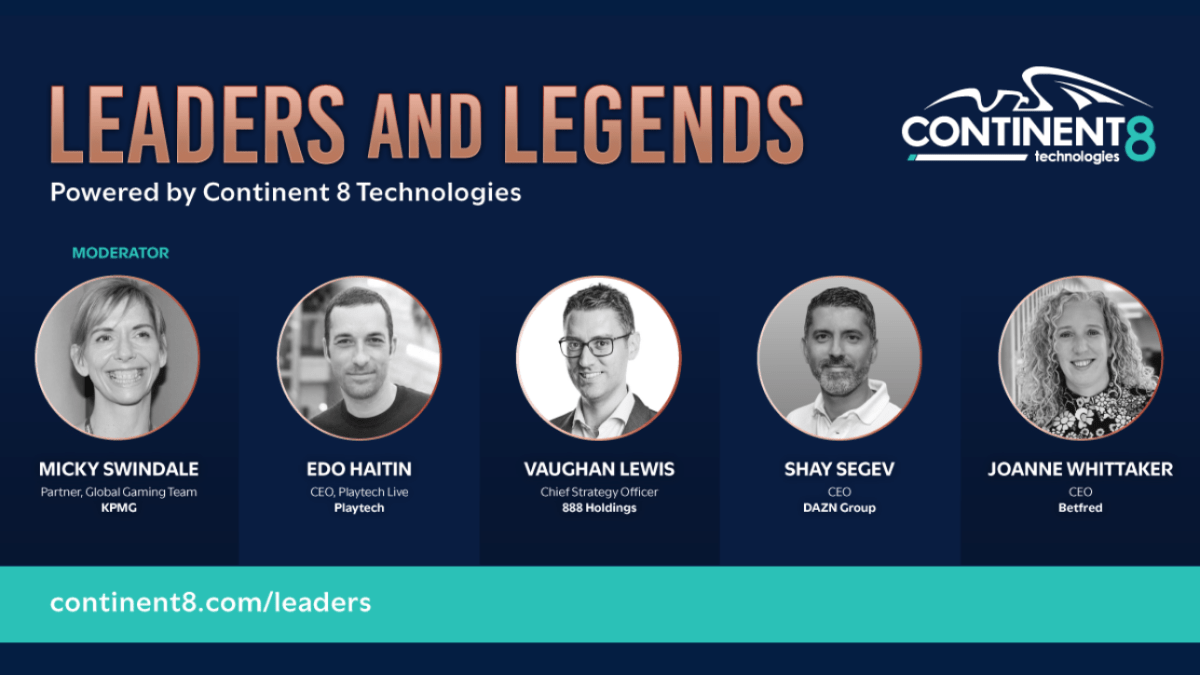
The Continent 8 Leaders and Legends series has been running for several years now, bringing together some of the industry’s biggest names to share their thoughts, insights and experiences on the hottest trends of the moment. The latest Leaders and Legends took place at the KPMG Gibraltar eSummit and saw heavyweights Shay Segev (Chief Executive Officer at DAZN), Joanne Whittaker (Chief Executive Officer at Betfred), Edo Haitin (Chief Executive Officer at Playtech Live) and Vaughan Lewis (Chief Strategy Officer at 888 Holdings) take to the stage to discuss a wide range of topics from the review of the UK Gambling Act to the future of retail in an increasingly digital world.
Moderator:
Micky Swindale – Partner, Global Gaming Team – KPMG
Panellists:
- Edo Haitin – Chief Executive Officer – Playtech Live
- Vaughan Lewis – Chief Strategy Officer – 888 Holdings
- Shay Segev – Chief Executive Officer – DAZN
- Joanne Whittaker – Chief Executive Officer – Betfred
MS: What changes do you expect to see as a result of the UK government’s review of the Gambling Act? What impact might tighter restrictions have on the market and how are you preparing for them?
JW: We just need to know what is coming. The review is hanging over us and we just need to be able to move on as an industry. We are agile, we evolve. We have heard some of the expected changes around slot stake limits, enhanced affordability checks, the levy and so on but until we know exactly what changes are coming, it is hard to properly prepare. Of course, as a business, we are trying to get ready for what is to come. I think initially there was a bit of panic, but we have got passed that now. We had a significant hit on retail when the FOBT legislation came in a few years ago, but we survived that and when I talk to Fred, he always says these legislative changes come in cycles. So, we are watching, we will respond, and I hope that we are given time to implement the technology changes that will be required. But right now, it’s just a case of wait and see.
VL: I think getting the line right as to where gambling tips over from personalisation, enjoyment and the promotion of great products and offers into something that becomes exploitative is the really challenging area that the review of the Gambling Act is trying to address. For us, we just want clarity about what are the standards that we need to meet. Once operators have that clarity, we then back ourselves to be able to provide a great player experience but with high levels of safety and within the standards set. At the moment, we are not clear on what standards we are trying to meet so our hope is that through the review process we get that clarity. Once any changes from the review have been implemented, we can then refocus on delivering the best player experience.
EH: Coming from the provider side, my perspective is perhaps a bit different. I believe that it is in the product to solve issues around responsible gambling and affordability and to deliver the right player experience. This also needs to be done in a way that the regulator can see that the player is doing so within their affordability. So, it is our responsibility as a provider to give our operators the products to do this. On the flip side, and especially as a big provider, I do feel for smaller businesses as the bar for entry into the market is being set even higher. So, regulators should bear in mind that there are companies making their first move that do need clarity and guidance as to what is expected of them.
ML: All jurisdictions, including Gibraltar, are having to quickly adapt to market changes. But what makes Gibraltar such an appealing jurisdiction to companies such as DAZN?
SS: We recently announced that DAZN would be going into betting with the launch of DAZN Bet and that we would be using Gibraltar as the hub for that. Having personally been based in Gibraltar for the last ten years I have found the jurisdiction to be amazing both in terms of the government’s support for the industry and the infrastructure it has provided, as well as the ability to establish a business here. It is also highly respected in terms of its regulatory framework and standards, and the talent that can be accessed here is second to none. This made it a very easy decision for us to set up DAZN Bet in Gibraltar.
MS: As the industry continues to grow, we have seen a real wave of M&A activity crash over the sector. With no sign of these mega deals slowing down, is now the right time for smaller businesses to position themselves for a takeover? And what makes for an attractive acquisition target?
VL: We are not seeing any slowdown in the trend of mega transactions. We have been through multiple waves of M&A and deals just keep getting bigger and bigger. We just closed a £2bn transaction but that now seems relatively small. Just before Christmas, Flutter undertook a £2bn acquisition and didn’t even have an investor call to explain it, it’s kind of like a bolt-on for them now. And then a few weeks ago you have the MGM takeover of LeoVegas, which it called “bite-size”. We are definitely in a new phase of the industry where these huge businesses have been created and significant value has been generated, and that is starting to really drive the M&A cycle.
At the medium and smaller end, we are still seeing a lot of activity. These transactions often have one or more characteristics that they share including unique products and content that you just can’t get elsewhere or that you can’t create quickly enough, market access, media convergence and other attributes that drive outsized value. This is where the future focus of M&A will be.
MS: The big four operators now account for more than 50% of the UK market share, so these companies can leverage the advantages of scale. But what impact does this have on consumer choice?
EH: We are an entertainment business, and the future of entertainment cannot be controlled by big companies. We see today that the biggest entertainers in the world are individuals that pick up their smartphones and cameras and stream videos on YouTube to tens of millions of followers. That makes them the big force in entertainment. I understand why companies undertake M&A and want to drive scale, but will this stop other businesses from entering the industry, I don’t think so. The nature of entertainment is so fluid that what is popular now will be different in five years’ time and we will most likely consume it differently. Once you work with video and content, you really pay attention to this and when we look at the market and what is in front of us, we see our immediate rivals but also those on the sidelines of the industry. Consolidation might block the immediate entry for some companies, but I do not believe that it will block the variety and versatility of the products that are offered to players.
SS: I think we might also see consolidation between industries with new experiences coming in. Where betting and gaming were perhaps seen as unethical just a few years ago, big businesses from outside of the sector are undoubtedly now looking at it. I think the US opening up has changed perceptions, too. For example, ESPN and Disney have indicated they are considering betting as a potential market for them to explore.
MS: The industry is expanding internationally with new jurisdictions embracing licensing and regulation all of the time. But with most taking a state-by-state or province-by-province approach, just how tough is it for operators to be truly global?
VL: If you were to ask all operators and suppliers if you could wave a magic wand and have harmonised rules across the world, I think the vast majority would say that is the dream scenario. It would enable us to really focus on product innovation and development, player protection and ultimately creating a much better consumer experience rather than having to spend time tailoring the platform for each market. We are one of the few operators that have a global, scalable platform that can run in multiple jurisdictions, but we have to tailor that to each market. If you look at the US, the investment we have to put into each state to meet the local tax and disclosure regulations sucks up a lot of time and diverts resources away from other areas that could be much more productive in terms of making great products and really looking after players. The more we can move towards standardised approaches, especially in the area of player protection, the better it will be for all stakeholders.
EH: Any company that wants to enter regulated markets such as the UK really needs to have a strong compliance team in place. This team is not there to scare you but to give you direction when it comes to developing products within the guidelines set. For us, one of the biggest challenges in the US is that we have to create a dedicated studio in each of the states that we enter based on the Wire Act of 1961. At the time I couldn’t understand why we could not just build one studio, but now we are up and running I see it as a good barrier to the competition. Really, you need to embrace regulation and understand the meaning behind it, even if you do not agree with it. For us as a live casino provider business, having to create a studio in each of the states we target is not optimal. But if you can understand the playground you are in and cater to that culture, it is possible to succeed.
MS: In all of our talk about online, are we losing sight of the land-based punter? Is it true that once they have gone online, they will never come back to retail betting?
JW: During Covid, it was a real fear for our business. Our retail shops were forced to close which saw our online business grow significantly but now restrictions have been lifted we have seen retail fully bounce back. We are really pleased with how the high street is performing and we can see that our customers are enjoying the betting shop experience and especially the social element. Long may that continue.
SS: You can’t ignore that betting shops are more part of the past than the future of the industry. I do think there is an opportunity to reinvent the betting shop experience, which some operators are doing with things like self-service betting terminals. There is something there but, clearly, it is not on the rise and consumers are transitioning to digital. That said, there is room to create something synergistic between retail and online.
JW: I agree there will not be new betting shops coming but at the turnover level customers are returning and they want to come to the shop. Our digital business has normalised, but we are in a much stronger position than we were pre-Covid. There is a place for the high street; I believe in SSBT and omnichannel but customers still want to come into the retail environment. We are also seeing this in other territories. In our US business, the retail performance is strong in the casinos where we have partnerships and in South Africa, we have a significant retail presence, too, although it is a very different retail offering with a much bigger footprint with 30-40 tills. I understand the importance of digital, but retail will survive.
VL: As an industry, we do not do a great job of standing up and talking about the value of the products we are selling. Retail is back to where it was post-pandemic because people love it, and they go to the shops because it is a fun thing to do. It is similar to the convergence of media and online, so long as we are providing something of value to consumers then that’s great. I think we should be proud of the service and entertainment we provide and for me, retail betting still provides a huge amount of enjoyment for customers. Betting shops never really went away, they just had to close due to the pandemic and they remain a core part of the industry.
EH: I’m going to take the middle ground here. Retail is back and I think part of the reason why players are enjoying going to betting shops is that it was taken away from them for a long time. But I do agree with Shay that reinventing betting shops is an important thing. This includes self-service and other experiences that will drive people to retail as well as online. As a live provider, we are often asked if we are cannibalising land-based by my answer is always no. We are an extension of the business, and I don’t believe we can really replace the experience of going to a casino.
Powered by WPeMatico
Holly Fairweather Head of Account Management at House of Brands provider White Hat Studios
Women in iGaming Interview: White Hat Studios’ Holly Fairweather
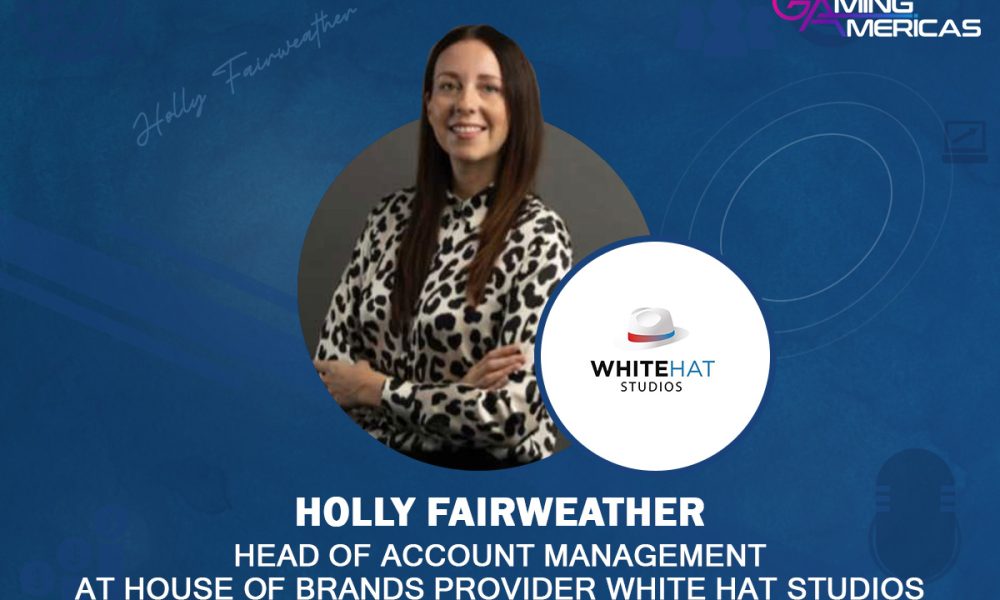
Holly Fairweather, Head of Account Management at House of Brands provider White Hat Studios, sits down with Gaming Americas to discuss the growing influence of women in the iGaming industry, and highlights how more can be done to improve the overall gender imbalance
Gaming Americas: Since joining the industry in 2018, have you noticed a change in how women are represented within iGaming companies, as well as general attitudes?
Holly Fairweather (HF): When I reflect on the past six years, it feels great to say I have seen a lot of positive changes in our industry and more importantly, an ever-increasing drive to address gender diversity. There is still work to do, and I am reminded of this attending our industry events, where it’s very evident we still lack female presence in C-level roles and on expert panels. It’s also not hard to see walking around conferences the overall gender imbalance that exists. With that being said, I do feel it’s moving in the right direction and I am regularly inspired by women around me being promoted to senior management roles, providing great mentors and role models. Awareness of gender diversity and celebrating success is continually being pushed via various channels, and for me plays a big part in why we are seeing more women have the confidence to progress in their careers and more women enter the industry. It’s also important to say, and why I think change is happening more, that the want of women to succeed and to increase female presence in our industry, is indeed backed by a strong support network of women supporting women, but also of the men in our industry.
Gaming Americas: How important are groups like Global Gaming Women? What kind of initiatives have they offered to help your own career development?
HF: I’ll be honest, I’m still learning about all that Global Gaming Women offers. Working in the US market I see GGW as a substantial network which offers reams of support from training courses, lean in circles and mentorship and networking events just to name a few. I have taken part in a few of the industry wide networking events, and really enjoyed them, connecting with some amazing people, learning more about the industry. One of my objectives this year is to participate in more events, adding value where I can whether that’s within the GGW network or through other avenues.
Gaming Americas: What more can the industry do to make it more appealing to women and ensure they are better represented within organizations?
HF: It’s got to start within each individual company taking responsibility for equal representation. This is not a tick box exercise to achieve a target on a gender split % by x date but must be about promotions and roles being rewarded to the best candidate for the role, regardless of gender, ethnic background, or sexual orientation. We need to shout about the success stories of DEI within the industry, creating an inclusive work environment will attract not just more women but more candidates overall, increasing the talent pool.
There is also a piece around exposure and shining the light on the fantastic women we have leading the way. Sharing their career paths, the good, and the challenges, to provide relatable examples of success. To make women in gaming not about the stats or portray the headline as a negative but more around showcasing the women that are successful and why, helping more women relate and pursue a similar path if this is what they wish to do.
Gaming Americas: What advice would you give to the next generation of women that are looking to make a breakthrough in the industry?
HF: This is a good one! First and foremost, you lead your own progression. Be proactive in building your network, push yourself out of your comfort zone to attend networking events. Reach out to other women in the industry for support and mentorship. That is on you to drive.
Immerse yourself in a team with values that align with yours, a team that welcomes and promotes diversity of all types and supports and rewards on merit are key.
Build your knowledge, for me knowledge is confidence. Quickly realise it is ok not to know everything, ask the questions and find out. Be solution-oriented, supporting your superiors will get you noticed for going over and above and adding value to your team and company.
I was told ‘people do business with people,’ which I stand by and could not be truer in the igaming industry. Always treat everyone with respect, be kind, be yourself, but don’t forget to back yourself! Relationship building is so key in this industry and has helped me progress to where I am today.
Lastly, take risks. And by this, I mean sometimes you must step out your comfort zone and push yourself to try something different to progress to the next stage. So far, the most pivotable moment in my career and biggest risk I have taken, and I’m sure Andy Whitworth (CEO) and the White Hat Studios (WHS) team won’t mind me saying, was accepting the job at WHS. A brand-new supplier to the US, no content live alongside the fact I had never worked in the US market, so of course there was an element of risk. It was, however, a calculated risk as I was joining a team of experts, senior level management I had worked for previously, in an ever-growing US market. A no brainer now when I look back.
Gaming Americas: From a White Hat Studios perspective, what DEI initiatives does the company put in place?
HF: DEI of all types is something I believe increases the performance of a team, and is something we are extremely passionate about at WHS. As we grow and expand, maintaining a strong culture has never been more important. We recently held a WHS workshop in Prague, with one section of our day spent holistically agreeing and locking down our values as a team, ‘Who we are, what we stand for ‘and ‘treating everyone equally’ is now embedded in our company culture as one of our five core values.
I have been lucky in the fact I have never felt that my gender has held me back in my current role and previous igaming companies. Although I understand this has not been everyone’s experience, I truly believe the more we celebrate success, drive awareness, embed inclusion within our companies, and work together across DEI as a whole, we will continue to see women progress and take on careers in igaming.
Compliable
Reputation matters – the importance of supplier licensing
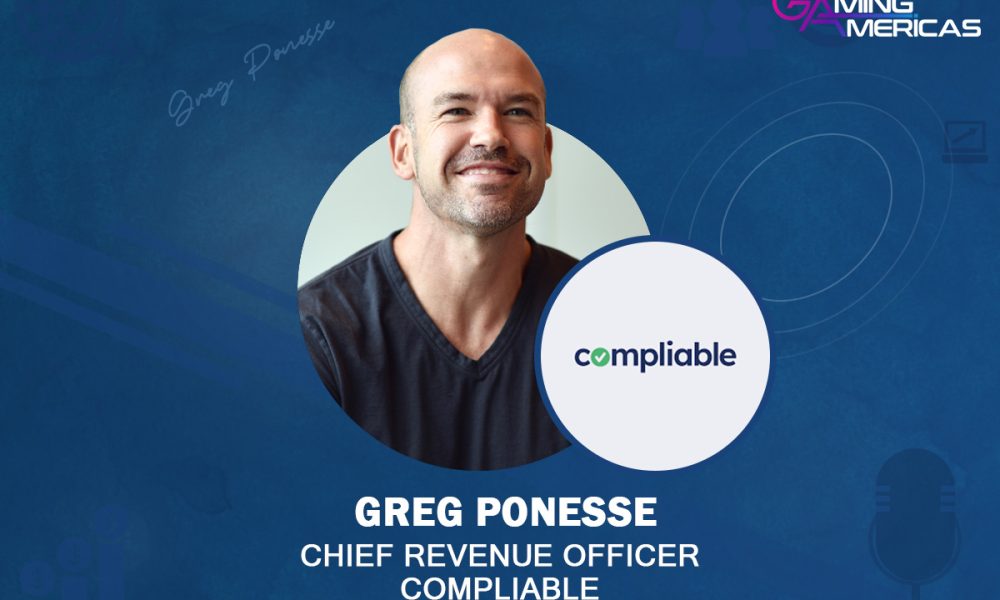
More and more jurisdictions are introducing licensing for B2B providers in an attempt to boost regulatory oversight and restrict black market activity with Sweden and Denmark recent examples. In this piece, we talk to Greg Ponesse, Chief Revenue Officer at Compliable, about how the increased compliance burden can favour suppliers’ standing in the iGaming ecosystem.
Have you seen a shift in attitudes from suppliers to only provide products in regulated markets?
We have seen that suppliers that have traditionally taken a .com approach are starting to move towards being licensed to secure additional revenue and more customers but also to improve their overall reputation and standing. The perception of brand integrity plays a big part of the decision-making process because some operator partners might be reluctant to work with suppliers if they have a mainly grey-market approach.
In the US, supplier licensing has always been the norm, so where we are seeing attitudes changing is primarily with European suppliers. Although most suppliers might have a few licenses that they need to manage in key markets, they are now better understanding the importance of being seen as fully compliant across the board as regulation changes and operators are looking for trusted partners.
Some of these brands are massive enterprises who are now trying to get a handle on how to manage all their licenses across multiple regions, and we have seen an increased interest in our software to support that.
What has been the driving force for this – regulator pressure or business strategy?
It’s a little bit of both. Regulator pressure is definitely a big one as gambling becomes more ubiquitous and mainstream. It’s the responsibility of the government to provide structure and regulation to ensure safety for consumers and many are starting to realize that suppliers play an equally important role in that as operators. We have recently seen examples of locally licensed suppliers being fined by regulators for offering their products to unlicensed operators, so providers need to be on the ball to ensure their reputation stays intact.
That said, the grey market suppliers up to this point have stayed in grey markets because that’s what was available to them. Now you’re seeing new markets opening up like North America, which has been huge, where all states require suppliers to be licensed. These grey market players that have previously focused on Europe now see that there’s revenue over there to be gained, so they need to pull up their socks and play the game.
As a business strategy, suppliers can only remain in black markets for so long, avoiding paying taxes and declaring revenue. In a competitive marketplace, suppliers can definitely benefit from being more established and having numerous licenses. Operators might be wary to work with companies that don’t take compliance seriously so being able to show that you have X number of licenses and that you have infrastructure in place shows that you’re serious, and that you know what you’re doing. It kind of sets the table for you to have a soft landing and to be able to begin those discussions with potential partners.
A sole focus on regulated markets would suggest a negative impact on profits so what benefits do suppliers see from being licensed?
If the train is only going in one direction, you eventually have to hop on it. Moving away from grey markets will inevitably have a negative impact on profits but you then have to look at where you can find additional revenue. If you are a licensed supplier, it does allow you to work with the big local operators. You have to decide on whether you can make more money as a grey-market supplier or by going into markets being licensed and making the most of what that offers.
Do you expect more jurisdictions will introduce B2B licensing going forward?
Yes, for sure. Gambling is ubiquitous now and governments recognise that it’s a great revenue generator for them and it also helps with ensuring responsible gambling. With licensing, you provide a framework, infrastructure, and environment that is safe, and it ensures that everyone is on a level playing field. That needs to include all different sides of the industry such as operators, suppliers, affiliates etc. If everyone in the ecosystem follows the rules, it will be a better place for all.
What are the big challenges that suppliers face when it comes to licensing in 2024 and beyond?
Your licensing strategy, so basically, where you are going to go get licensed. This process takes time and resources, and you want to make sure you are prepared before you start talking with operators. They will want to know, just like as with any other vendor, if you are licensed as a supplier.
If we use the US as an example, there is no shortage of suppliers that want to partner with the available operators, so you need to know who you want to work with and where, and then you have to make sure you sort those applications properly. That is all about getting the right advice or using software because if you fail the process, you will end up at the back of the queue and your go-to market strategy will be delayed.
What, if any, are the key differences between licensing in the US and regulated markets in Europe and other regions around the world?
For starters, every state in the US acts as if it is its own country and the licensing process is very complex and rigorous. In Europe, it was initially somewhat more relaxed. You got your Malta licence, and that was then good for all countries in Europe. We’re now seeing a bit of backtracking, with more and more countries getting tougher on rules and regulation.
Increased supervision, with regulators having more oversight, means there is no hiding and I think that is what we’re moving towards on a global scale.
I do believe that most suppliers and operators prefer a regulated market because it separates proper companies from the bad ones. If I was a large operator or supplier that invested time and money into licensing and establishing a compliance team, I would feel good about that because there are so many companies that can’t do it. There’s this element of pay to play, so to speak, in order to really maximize your profits in a region.
Interviews
Changing the game for content aggregation
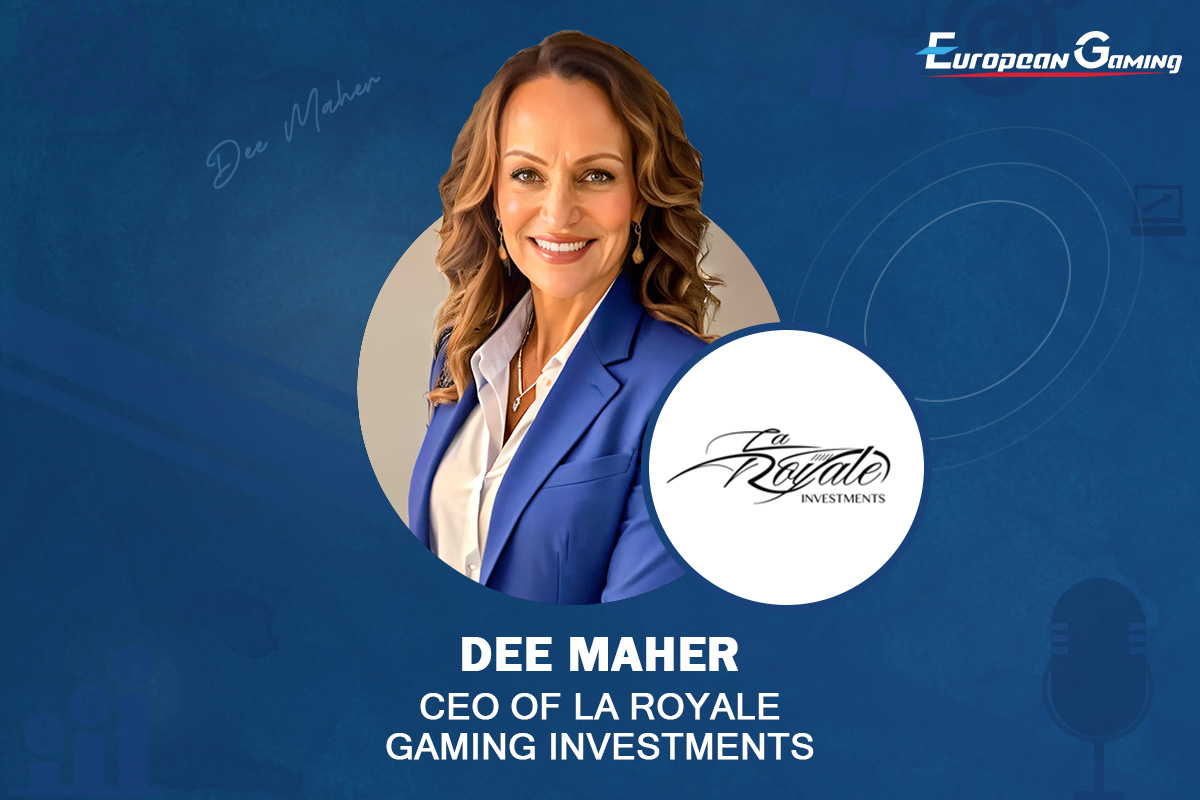
We sit down with Dee Maher, CEO of La Royale Gaming Investments, to learn more about her recent appointment as CEO and how the company is set to challenge the gaming industry’s conventions.
La Royale Gaming Investments has bold plans to become a true power player and redefine industry standards. Through acquisitions and mergers, it intends to build an “ecosystem” of online and offline companies, covering both B2B and B2C. Its first play is Quanta, a unique content aggregation platform designed to leverage a high volume with a focus on delivering unparalleled value at a fair price, aiming to introduce innovative solutions for both operators and suppliers. To learn more about La Royale and its goals for the coming 12 months, we spoke with recently appointed CEO, Dee Maher.
Tell us more about your journey to being appointed as CEO of La Royale Gaming Investments.
I’ve been working in the global online gambling industry for many years now in roles covering legal and compliance leadership. Over the past 15 years, I have had the privilege to work for some of the biggest organisations in the business including the likes of Genesis Global, Betclic, Vera&John and Evolution Gaming. When I was approached about joining La Royale Gaming Investments as CEO, it was an offer that I couldn’t turn down. Recognising the company’s ambition to forge a transformative path in the gaming sector, I was compelled by the vision to lead change and drive innovation. My decision to accept was driven by a profound commitment to spearhead our mission, leveraging the remarkable talents of our team to redefine industry standards and make a lasting impact.
What are your main responsibilities and where are you looking to progress most?
I have been tasked with supervising the expansion of our investment portfolio by recognising opportunities that are aligned with our online and offline strategies. I am also overseeing the day-to-day running of Quanta, our inaugural venture, which stands out in the crowded marketplace as a game aggregation platform like no other. In terms of where we are looking to make the most progress, we plan to curate a unique ecosystem of innovative offline and online gaming companies through strategic mergers and acquisitions which combined will make La Royale Gaming Investments a real tour-de-force in the sector and one of the top tier companies with interests across both B2B and B2C.
How is La Royale Gaming Investments going to disrupt the industry? Is it taking a different approach?
La Royale Gaming Investments is poised to redefine the gaming industry with a strategy rooted in bold vision and innovation. We have built out the best team to deploy these ambitious plans and achieve our strategic goals. We are well-capitalised and have lined up our first run of acquisitions, starting with Quanta. Our approach focuses on identifying USPs within each business we engage, introducing ground-breaking offerings to the market. With Quanta, that is being the first mass-market game aggregation platform, creating value for both operators and suppliers. This is an industry where many follow the same blueprint, but we know that to pull distance from our competitors, we need to do things a little differently.
I think our biggest point of difference is that we are curating an ecosystem of innovative businesses across all areas of gambling and gaming. This includes both online and offline, and both B2B and B2C. There are not many organisations in the industry that are this broad and diverse so again this is an area where we can really stand out.
You mentioned that Quanta is the first mass-market game aggregation platform. What does it offer operators and suppliers and how is it different to other solutions in the market?
Quanta has been developed so that it can handle the largest possible volume of games from a diverse array of providers and seamlessly integrate with a vast network of operators. Due to this volume, we can offer the best commercial deals to both parties. Our scale, in collaboration with leading studios and casinos, positions us as a frontrunner in content distribution. Furthermore, we are committed to achieving certifications across all significant regulated markets. For operators, this means they can quickly and easily add games to their lobbies and for studios, it means access to the widest distribution network and thanks to our minimum reseller fee structure, we make this access available to all providers from the established titans to the rising stars.
But just to be clear, Quanta transcends the ordinary, offering not just a cost-effective solution but a sophisticated high-performance platform. The platform is state of the art, allowing for seamless integrations for both operators and suppliers while ensuring the highest standards of resilience and performance. The concept is simple – high volume, low cost – but the advanced technology and strategic foresight required to realise this vision set us apart from conventional solutions in the market.
Content provision is highly competitive so what makes you confident that Quanta will be heard above the noise being made by other providers and aggregators?
Our mass market approach is unique and is already helping us to stand out and generate significant interest from both studios and operators. In the current challenging economic landscape, efficiency and cost-effectiveness are paramount for all stakeholders. But our advantageous commission structure is not the only way we are helping here. At present, operators often have many integrations with various aggregators and directly with game providers. This is inefficient and expensive. With Quanta, operators can plug into a single platform and access all the content they need for each market they target allowing them to save significant resources or to deploy these resources elsewhere.
On the subject of the current economic climate. Is now a good time to be building a business based around M&A?
That depends on how you are approaching your M&A activity and whether an organisation is taking on debt. Timing can be crucial here – you just have to look at the likes of 888 to see how a change in the direction of the wind can have a brutal impact on the wider organisation. That said, there are always plenty of opportunities to acquire great businesses, technologies, solutions and so on, and part of my remit as CEO is to spot these and if they align with our wider approach, make a move. I think the 12 months ahead will be incredibly exciting when it comes to M&A, with some truly transformational deals taking place – something that La Royale Gaming Investments intends to be a part of.
The post Changing the game for content aggregation appeared first on European Gaming Industry News.
-

 Balkans4 days ago
Balkans4 days agoCT Gaming to Showcase its Latest Products at the Belgrade Future Gaming Exhibition
-

 Australia4 days ago
Australia4 days agoNerida O’Loughlin Reappointed as ACMA Chair
-

 Asia4 days ago
Asia4 days agoIndonesia Establishes Task Force to Combat Online Gambling
-

 British Columbia Lottery Corporation4 days ago
British Columbia Lottery Corporation4 days agoSCCG Management Signs Contract with British Columbia Lottery Corporation
-

 Latest News4 days ago
Latest News4 days agoNetBet Casino Joins Forces with Habanero
-

 Latest News4 days ago
Latest News4 days agoPRAGMATIC PLAY DROPS CANDY BLITZ BOMBS
-

 BiS SiGMA Americas3 days ago
BiS SiGMA Americas3 days agoSportingtech Places New Local Talent Front and Center at BiS SiGMA Americas
-

 Andre Filipe Neves3 days ago
Andre Filipe Neves3 days agoSalsa Technology Hails Hugely Successful BIS SiGMA Americas

